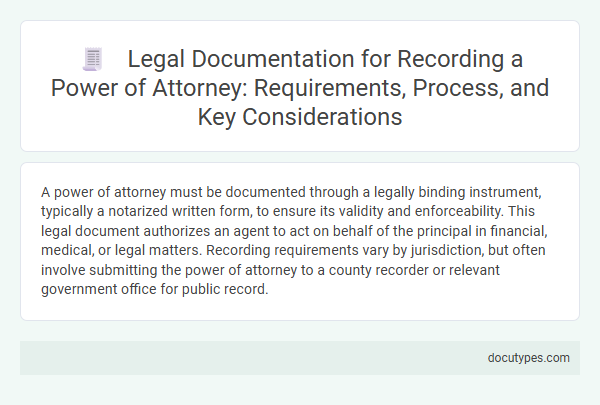A power of attorney must be documented through a legally binding instrument, typically a notarized written form, to ensure its validity and enforceability. This legal document authorizes an agent to act on behalf of the principal in financial, medical, or legal matters. Recording requirements vary by jurisdiction, but often involve submitting the power of attorney to a county recorder or relevant government office for public record.
Introduction to Legal Documentation for Power of Attorney
Understanding the specific legal document required to record a Power of Attorney (POA) is essential for ensuring its validity and enforceability. Proper documentation safeguards the principal's intentions and grants the agent clear authority to act on their behalf.
- Power of Attorney Document - A formal, written instrument granting authority from the principal to the agent.
- Notarization Requirement - Often mandatory to validate the authenticity of the POA document.
- Recording with Relevant Authorities - Some jurisdictions require the POA to be recorded with county or state offices for real estate or financial transactions.
Accurate execution and recording of the Power of Attorney document are fundamental to its legal recognition and effectiveness.
Types of Power of Attorney and Their Legal Implications
A Power of Attorney (POA) is a legal document granting one person the authority to act on behalf of another in legal or financial matters. Different types of POAs include General, Durable, Special, and Medical, each serving specific purposes and limitations.
Recording a Power of Attorney usually requires a notarized and sometimes witnessed document depending on jurisdictional laws. Your choice of POA type affects the scope of authority and legal implications for both the principal and the agent.
Core Legal Requirements for Power of Attorney Documents
| Legal Document Type | Power of Attorney (POA) Form |
|---|---|
| Core Legal Requirements |
|
| Recording Requirements |
|
| Legal Effect | Enables the agent to act legally on behalf of the principal within defined limits |
Essential Elements to Include in a Power of Attorney
What type of legal document is required to record a Power of Attorney? A Power of Attorney must be a notarized and properly executed written document to be legally valid. It typically requires signing in the presence of a notary public and witnesses as mandated by state law.
What are the essential elements to include in a Power of Attorney? Your Power of Attorney should clearly identify the principal and the agent with full names and addresses. It must explicitly state the powers granted, the duration of authority, and any limitations or special instructions for the agent's actions.
Step-by-Step Process for Recording a Power of Attorney
Recording a Power of Attorney requires specific legal documents to ensure its validity and enforceability. Understanding the step-by-step process helps protect your interests and comply with state laws.
- Prepare the Original Power of Attorney Document - The document must be properly signed and notarized according to state requirements before recording.
- Complete the Jurisdictional Forms - Some states require additional forms or affidavits alongside the Power of Attorney for recording purposes.
- Submit to the County Recorder or Appropriate Office - The executed document must be filed with the correct local government office, often the county recorder, for official recording and public record.
Jurisdictional Variations in Power of Attorney Documentation
The type of legal document required to record a power of attorney varies significantly depending on the jurisdiction. Understanding these jurisdictional differences is essential to ensure the power of attorney is legally recognized and enforceable.
- Notarization Requirements - Many jurisdictions mandate notarization of the power of attorney document to verify the identity of the principal and the voluntary nature of the grant.
- Specific Form Mandates - Certain states or countries require the use of standardized or government-prescribed forms for the power of attorney to be valid.
- Recording Procedures - Some jurisdictions necessitate filing or recording the power of attorney with a county or governmental office, such as a land records office, especially if it pertains to real estate transactions.
Key Legal Considerations for Drafting and Execution
A Power of Attorney must be documented in a formal written legal instrument to be valid and enforceable. Key legal considerations include clearly specifying the powers granted, ensuring compliant execution through notarization or witness requirements, and adhering to jurisdiction-specific regulations. Your attention to precise language and proper signing formalities safeguards the document's legal integrity and effectiveness.
Common Pitfalls and How to Avoid Them
Recording a Power of Attorney (POA) typically requires a notarized document that outlines the authority granted to the agent. The exact type of legal document can vary by jurisdiction, often necessitating a specific form or affidavit to be filed with the county recorder or relevant government office.
Common pitfalls include submitting a POA that lacks proper notarization or fails to meet state-specific requirements, which can invalidate the document. Another frequent issue is using outdated forms that do not comply with current laws, leading to rejection during recording. Avoid these problems by consulting local statutes, ensuring the POA is properly notarized, and using updated, jurisdiction-approved templates.
Revocation and Amendment of a Recorded Power of Attorney
A Power of Attorney (POA) must be recorded with a legal document that clearly outlines the scope and authority granted. This ensures the POA is officially recognized and can be used in legal and financial matters.
To revoke or amend a recorded Power of Attorney, a formal Revocation of Power of Attorney document must be filed with the same recording agency. Amendments require a written Amendment to Power of Attorney that specifies the changes and must also be recorded to be effective.
What Type of Legal Document Is Required to Record a Power of Attorney? Infographic

